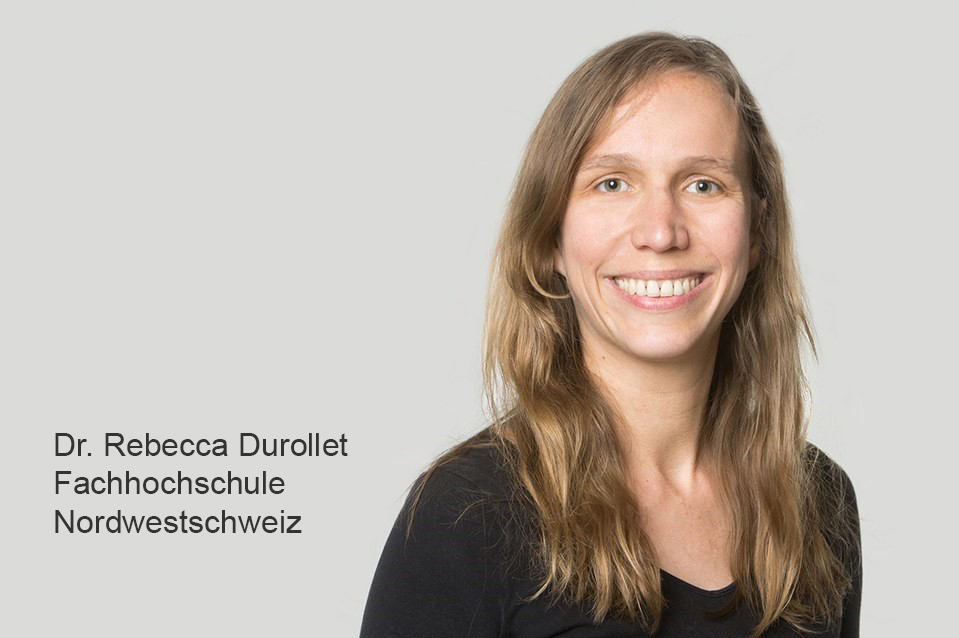Interview
Isabel Heger-Laube, MA, University of Applied Sciences and Arts NorthwesternSwitzerland
Why is this study necessary?
The group of older people who cannot count on their family for everyday care keeps growing due to demographic change.

This is a challenge as unpaid care for the elderly by the closest relatives is still an unspoken rule in Switzerland. Moreover, generally - including internationally - very little is known about the target group of older people without a family network to care for them. Most of all, there is a lack of knowledge about their subjective perspectives of their life situation, their own ideas of a good life in old age and their individual needs. So, our study has two aims: the first is to attain a better understanding of the target group. We would also like to recommend measures for preserving or improving the quality of life of older people who don't have family to look after them.
Are there already initiatives afoot in working with the elderly that cater to this target group?
Yes and no. There are many offers, initiatives and pilot projects across Switzerland that aim to provide everyday support to the elderly in different ways. There are especially promising initiatives, for example, in introducing case management jobs, developing caring communities, creating new contact persons, for example the "social concierge", setting up local contact points or also in the direction of setting up social work for older people in the area. Most of these projects have, to date, only implicitly considered our target group. A rethink is needed in some respects to address older people without a family network and take care of their needs.
Rebecca Durollet, University of Applied Sciences and Arts Northwestern Switzerland
What are the main findings that emerged from the study?
The needs, wishes and fears of our target group are as varied as the number of elderly people - that's why we need approaches compatible with this heterogeneity.

Furthermore, growing old without family to care for you does not immediately equate to being particularly vulnerable, although that is often the narrative with regard to ageing in Switzerland. Being alone in old age also does not necessarily mean being lonely or unhappy. Nonetheless, growing old without family to look after you when lacking social or financial resources or if you fall through the gaps in the social securi-ty network can be a problem. Without the important support a family can provide, shortcomings may emerge, for example regarding access to information, dealing with difficult future issues or everyday psy-chosocial care.
Where else are there shortfalls in the research?
There is practically no information about older people living in Switzerland from a migrant background or with cognitive issues without family to care for them. In order to learn more about these specific groups, we need more in-depth studies involving, for example, everyday observation over an extended period. It would also be interesting to establish how our target group sees alternative living arrangements and espe-cially how older people themselves would evaluate different pilot projects. Finally, it would be interesting to establish whether and, if so, how the attitudes and expectations of the elderly without family to look after them change over the generations.
Dr. Yann Bochsler, University of Applied Sciences and Arts Northwestern Switzerland
How did you proceed with the study?
We selected a qualitative procedure. We used the capability approach of Amartya Sen as an analytical framework.

It is based on what the individual considers a "good life". We conducted our research at five locations in Switzerland. The study is divided into three sub-projects: in an initial phase, we used interviews to analyse the subjective perspectives of older people without family to care for them. In a second step, we examined the basic local conditions in which they grow old. Thirdly, we measured the results of the first two sub-projects against each other. We did that by means of a matching analysis between the needs of older people without a family network and the basic conditions in place and developed a qualitative typology. We used that as a basis to recommend action points for old-age policy and working with the elderly.
What specific action can a municipality now take?
The study showed that supply shortfalls persist. Needs related to everyday psychosocial care are often not met. That is the main deficit. Our results also indicate that it's not enough for a section of our target group to simply make offers "available", as it places the responsibility on them to do something about it. Offers by the municipality to work with the elderly should also be actively brought to the target group, i.e. shift responsibility to the providers. It is fundamental when planning old-age policy and implementing measures to explicitly recognise older people without a family support network as a target group, without labelling them at the same time as "vulnerable". Such labelling could put old people off taking the support offered to them. The use of old-age delegates in municipalities has proven successful in coordinating the different players involved in working with the elderly and what they offer. The municipalities need to provide the human resources needed for that.
Prof. Dr. Carlo Knöpfel, University of Applied Sciences and Arts Northwestern Switzerland
What were the problems?
We wanted to show the full range of life situations in the study in which the elderly live without family support. We didn't quite manage that.

The most vulnerable population group is underrepresented, and older men could also have featured more in the sample. The interviews were conducted during the pandemic, which proved particularly challenging as we wanted to speak to the most at-risk group. So, it's all the more impressive that we managed to conduct the desired number of interviews at all five study locations.
What recommendations would you have for old-age policy?
Good care for the elderly must be recognised and financed as a type of support in its own right. That entails a right to assistance at a national level, regardless of living arrangements. Funds to take good care of the elderly are well spent. Good care has a preventive effect. It improves quality of life in old age and helps the elderly stay out of care homes for longer, or even avoid them altogether. Caring for the elderly is a social duty. We need to match people trained in social care with those areas where professional support is needed.








